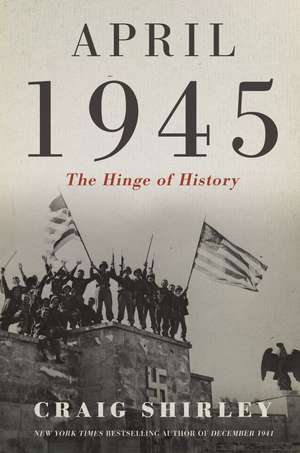April 1945: The Hinge of History
Autor Craig Shirleyen Limba Engleză Hardback – 21 feb 2022
In the long-awaited follow-up to the widely praised December 1941,Craig Shirley's April 1945 paints a vivid portrait of America--her people, faith, economy, government, and culture. The year of 1945 bought a series of watershed events that transformed the country into an arsenal of democracy, one that no longer armed the world by necessity but henceforth protected the world by need.
At the start of 1945, America and the rest of the world were grieving millions of lives lost in the global conflict. As President Roosevelt was sworn into his fourth term, optimism over an end to the bloody war had grown--then, in April, several events collided that changed the face of the world forever: the sudden death of President Roosevelt followed by Harry S. Truman's rise to office; Adolph Hitler's suicide; and the horrific discoveries of Dachau and Auschwitz. Americans doubled down on their completion of the atomic bomb and their plans to drop them on Hiroshima and Nagasaki, the destruction ultimately leading the Japanese Empire to surrender on V-J day and ending World War II for good.
Combining engaging anecdotes with deft research and details that are both diminutive and grand, April 1945 gives readers a front-row seat to the American stage at the birth of a brand-new world.
Preț: 194.84 lei
Nou
Puncte Express: 292
Preț estimativ în valută:
37.29€ • 38.52$ • 31.03£
37.29€ • 38.52$ • 31.03£
Carte disponibilă
Livrare economică 04-18 martie
Preluare comenzi: 021 569.72.76
Specificații
ISBN-13: 9781400217083
ISBN-10: 1400217083
Pagini: 528
Dimensiuni: 161 x 240 x 44 mm
Greutate: 0.68 kg
Editura: Thomas Nelson
Colecția Thomas Nelson
Locul publicării:Nashville, United States
ISBN-10: 1400217083
Pagini: 528
Dimensiuni: 161 x 240 x 44 mm
Greutate: 0.68 kg
Editura: Thomas Nelson
Colecția Thomas Nelson
Locul publicării:Nashville, United States
Descriere
Acclaimed historian and New York Times bestselling author Craig Shirley delivers a compelling account of 1945, particularly the watershed events in the month of April, that details how America emerged from World War II as a leading superpower.
In the long-awaited follow-up to the widely praised December 1941,Craig Shirley's April 1945 paints a vivid portrait of America--her people, faith, economy, government, and culture. The year of 1945 bought a series of watershed events that transformed the country into an arsenal of democracy, one that no longer armed the world by necessity but henceforth protected the world by need.
At the start of 1945, America and the rest of the world were grieving millions of lives lost in the global conflict. As President Roosevelt was sworn into his fourth term, optimism over an end to the bloody war had grown--then, in April, several events collided that changed the face of the world forever: the sudden death of President Roosevelt followed by Harry S. Truman's rise to office; Adolph Hitler's suicide; and the horrific discoveries of Dachau and Auschwitz. Americans doubled down on their completion of the atomic bomb and their plans to drop them on Hiroshima and Nagasaki, the destruction ultimately leading the Japanese Empire to surrender on V-J day and ending World War II for good.
Combining engaging anecdotes with deft research and details that are both diminutive and grand, April 1945 gives readers a front-row seat to the American stage at the birth of a brand-new world.
In the long-awaited follow-up to the widely praised December 1941,Craig Shirley's April 1945 paints a vivid portrait of America--her people, faith, economy, government, and culture. The year of 1945 bought a series of watershed events that transformed the country into an arsenal of democracy, one that no longer armed the world by necessity but henceforth protected the world by need.
At the start of 1945, America and the rest of the world were grieving millions of lives lost in the global conflict. As President Roosevelt was sworn into his fourth term, optimism over an end to the bloody war had grown--then, in April, several events collided that changed the face of the world forever: the sudden death of President Roosevelt followed by Harry S. Truman's rise to office; Adolph Hitler's suicide; and the horrific discoveries of Dachau and Auschwitz. Americans doubled down on their completion of the atomic bomb and their plans to drop them on Hiroshima and Nagasaki, the destruction ultimately leading the Japanese Empire to surrender on V-J day and ending World War II for good.
Combining engaging anecdotes with deft research and details that are both diminutive and grand, April 1945 gives readers a front-row seat to the American stage at the birth of a brand-new world.
